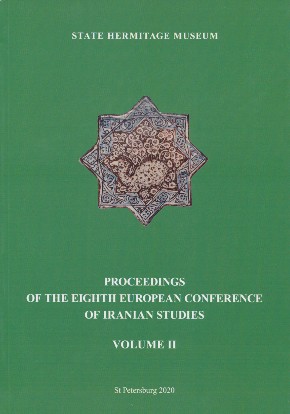 [ ñáîðíèê ]
[ ñáîðíèê ]
Proceedings of the Eighth European Conference of Iranian Studies
(State Hermitage Museum and Institute of Oriental Manuscripts, St Petersburg, 14-19 September 2015).
Volume II: Studies on Iran and the Persianate World after Islam.
/ In English. St Petersburg: State Hermitage Publishers. 2020. 364 pp. + XXX colour plates.
ISBN 978-5-93572-911-0 (vol. 2); ISBN 978-5-93572-869-4
Scholarly editor Olga M. Yastrebova. English editor Charles Melville.
[ àííîòàöèÿ: ]
The volume incorporates articles presented by the participants of the Eighth European Conference of Iranian Studies (in St Petersburg 14-19 September 2015) which were focused on Iran and the Persianate world during the epoch after the spread and domination of Islam. The articles cover the extensive span of time, from the pre-Mongol era to modernity, and follow a very wide range of research directions, including history, historiography, art history, contemporary politics and society, religious thought, literary studies and linguistics. The volume is addressed to Iranologists and specialists in neighbouring fields.
On the front cover:
Faience tile. Iran, second half of the 13th century.
State Hermitage Museum, IR-1275.
Ñì. òàêæå Vol. 1.
Contents
Editor’s Note. — 5
Adel T. Adamova. The Shāhnāmah in Il-Khanid Times. — 7
Nayyer Ahmadpour. Pictorial Metaphor in the Picture Books of Contemporary Iranian Author-Illustrators. — 31
Khalil A. Arab. Marriage in Afghanistan. — 41
Victoria Arakelova. Taming Lions and Riding Rocks: Power over Nature in the Heterodox Shi’i and Yezidi Traditions. — 61
Philip Bockholt. Writing History is a Difficult Task: On Khvāndamīr’s General History Ḥabīb al-Siyar and the Origins of Safavid Historiographical Writing. — 69
Larissa Dodkhudoeva. Persian Miniature Painting: Collection of the Academy of Sciences of the Republic of Tajikistan. — 76
Julie Duvigneau. The Bubble, the Whirlpool and the Spider’s Web: The Metamorphosis of Sadeq Hedayat’s Fictional Space. — 87
Nigar Gozalova. The Diplomatic Mission of General Ermolov in Qajar Iran. — 95
Negar Habibi. ‘Alī Qulī Jibādār and the St Petersburg Muraqqa‘: Documenting the Royal Life? — 111
Yuka Kadoi. A Historiographical Inquiry into the Falsification of Persian Art. — 122
Roman S. Khanukaev. On Another Group of Iranian Faiences (Late 18th — Early 19th Centuries). — 131
Elena Malozyomova. The Edged Weapons in the Court Ceremonial in Iran: 13th — Early 18th Centuries. — 137
Kinga Markus. The Legend of Shāpūr Ẕū al-Aktāf (Shāpūr of the Shoulderblades) in the Shāhnāmah of Firdawsī. — 149
Paulina Niechciał and Elżbieta Olzacka. Ties with Contemporary Iran: An Example of the Identity Strategy in the Pages of the Tajik Press in the Early 1990s. — 156
Ivonna Nowicka. ‛Iṣfahān – Firdaws-i Jahān’: Isfahan Remembered by Polish WW2 Child Refugees. — 172
Michael O’neal. Some New Numismatic Evidence for Ghurid History. — 199
Ludwig Paul. ‘Be Nice to Each Other!’ – Moral Precepts on Tehran Metro Walls as Examples of Written Colloquial Persian. — 222
Raya Y. Shani. An Illustrated Turkman Copy of the Manqabat-nāmah or Qiṣṣah-yi Shīr va Dīv Presenting the Religious and Mystical Dimensions of ‘Alī’s Image as the Lion of God and the Sword of Islam. — 245
Narciss M. Sohrabi. Public Art, Political Power and Public Space (Case Study: Sculptures of Tehran). — 277
Fatema Soudavar Farmanfarmaian. Of Banknotes and Bījaks. — 287
Tatiana Starodub. Saljuq Haft Rang Ceramics and Abbasid Miniatures: Stylistic Parallels. — 306
Boris Stojkovski. On the Possible Iranian Origin of the Muslim Population in Medieval Hungary. — 317
Iván Szántó. Courtly Arts in Crisis in Late Qajar Iran. — 328
Masataka Takeshita. A Shi’ite Theologian’s Criticism of Darwinism. — 335
Daria Vasilyeva. Rasht Figurative Hangings: Between Embroidery and Portraiture. — 345
Abbreviations. — 361
|